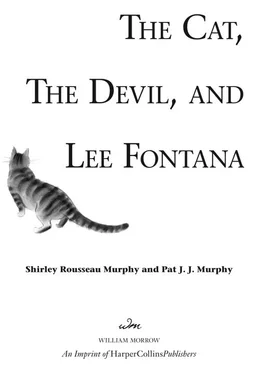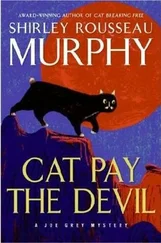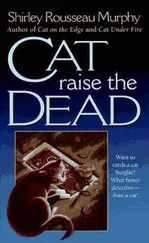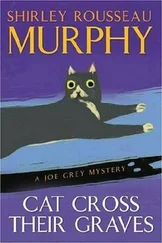Shirley Murphy - The Cat, the Devil, and Lee Fontana
Здесь есть возможность читать онлайн «Shirley Murphy - The Cat, the Devil, and Lee Fontana» весь текст электронной книги совершенно бесплатно (целиком полную версию без сокращений). В некоторых случаях можно слушать аудио, скачать через торрент в формате fb2 и присутствует краткое содержание. Год выпуска: 2014, Издательство: HarperCollins, Жанр: Старинная литература, на английском языке. Описание произведения, (предисловие) а так же отзывы посетителей доступны на портале библиотеки ЛибКат.
- Название:The Cat, the Devil, and Lee Fontana
- Автор:
- Издательство:HarperCollins
- Жанр:
- Год:2014
- ISBN:нет данных
- Рейтинг книги:5 / 5. Голосов: 1
-
Избранное:Добавить в избранное
- Отзывы:
-
Ваша оценка:
- 100
- 1
- 2
- 3
- 4
- 5
The Cat, the Devil, and Lee Fontana: краткое содержание, описание и аннотация
Предлагаем к чтению аннотацию, описание, краткое содержание или предисловие (зависит от того, что написал сам автор книги «The Cat, the Devil, and Lee Fontana»). Если вы не нашли необходимую информацию о книге — напишите в комментариях, мы постараемся отыскать её.
The Cat, the Devil, and Lee Fontana — читать онлайн бесплатно полную книгу (весь текст) целиком
Ниже представлен текст книги, разбитый по страницам. Система сохранения места последней прочитанной страницы, позволяет с удобством читать онлайн бесплатно книгу «The Cat, the Devil, and Lee Fontana», без необходимости каждый раз заново искать на чём Вы остановились. Поставьте закладку, и сможете в любой момент перейти на страницу, на которой закончили чтение.
Интервал:
Закладка:
Pushing some change across the bar, he rose, headed back along the pier for the station. He was just stepping across the tracks when the slow-moving engine gave a big blast and came into view ambling along close to the water, barely clearing the fir branches where they had been trimmed away, train huffing and clanging up to the station, squeal of brakes, shouts of the conductor. Lee dropped the clothes in the trash can, but kept the paper bag. He boarded quickly, with his ticket in hand, moved on in looking for a quiet space to himself.
He chose a half-empty car, took a seat away from the other passengers, laid his Levi’s jacket and his paper bag on the seat next to him, to discourage anyone from sitting there. The car smelled of stale sandwiches and ancient dust. As he settled into the dirty mohair, a fit of coughing took him. He coughed up phlegm, spat it into his prison handkerchief. He could see through the dirty window half a dozen people hurrying down from the scattered houses above. The train waited in the station maybe fifteen minutes. Only four more passengers had entered his car when the train began to back and jerk, moving with a lot of hustle, and they were on their way. If this train made every little stop, it would be a slow, halting trip down across Washington and Oregon and into California—but then soon the train stretched out, moving fast, its iron wheels hitting a steady gallop that calmed and steadied Lee, the way speed had always calmed him.
When the vendor came by he bought dry sandwiches and coffee, the same sandwiches he’d live on for the next two days. He tried to clean the grimy window with his dirty handkerchief so he could see out, but he only smeared it worse. Irritated, he went out to stand in the windy vestibule between the cars, looking out at the waters of Puget Sound enjoying the sea while he could, the cool damp air, the green marsh along the inlets, before he got on down to the dry desert. He’d been up in this country a long time, away from that hot, parched land. He craved the dry heat, but he knew the muddy, sluggish Colorado River wouldn’t be the same as the living sea, not like this surging water eating away at the lush and ragged edge of the continent. The overcast had followed them, but had thinned near the ground, enough to let him see an eagle soaring low overhead looking for dead fish. He stood clinging to the iron bar watching the dark waters and green marsh, and then looking out the other side, taking pleasure in the little farms, their cattle and fat horses knee deep in grass. When he was a boy on the dry prairie they’d never had grass like that, a man could only dream of feed like that for his stock.
Settling in for the long pull down to L.A., he gravitated between the dusty car, the narrow windy vestibule, and the men’s room where he shaved and washed himself as best he could using their dinky little bars of soap, and paper towels. He slept in his seat, ate the dry sandwiches, read other people’s discarded newspapers, and he thought too much.
The hitch at McNeil was the longest he’d ever served, he shouldn’t have had a ten-year sentence. The only reason he got caught was sloppy work, and that had worried him. For the first time he knew he was getting old, afraid he’d lost his touch, maybe lost all talent for making a living in the only way he knew, the only way he liked. He’d give all he’d ever stolen or earned to be young and vigorous again, to be back in the early part of the century, back when the prairie was free and open, a good horse under him, nothing to think about but when the next steam train was due and what it carried, how much gold and cash—but then came the diesel trains, during the war, and you couldn’t stop those babies by riding across the track waving a gun at the engineer. And those trains carried dozens of guards, soon there wasn’t just one detective named Pinkerton to investigate a train job but a whole organization called Pinkerton, nosy, high-powered bastards, and his own times, his own ways were gone into the dust of the past.
After the steam trains were finished he’d worked cattle for a while, doing his first paid work in years. Then, long before America got into the war—but when many folks knew that day would come—he had taken a job in Montana, in Billings, breaking horses for the remount. Later, during the war, he’d heard that even the coast guard was using horses, patrolling the coastal beaches at night watching for German submarines.
For two years he had worked for the government breaking horses, he’d been straight then, no robberies, and he had, strangely, felt almost good about that. But then the itch for a thrill got him. When he left Billings he took on the Midnight Limited out of Denver, a diesel carrying military payroll. He’d planned every detail carefully, had even worn gloves to avoid fingerprints, accepting the annoying traps of modern technology. He had brought off the job alone without a hitch, had left the conductor and four guards tied up in the express car, had stashed the strongbox in the truck he’d hidden in an arroyo south of Grand Junction. But then, one second of bad judgment and he blew it. Blew it all, real bad. One second, standing beside that old Ford truck thinking how the money in the strongbox was meant for the new recruits at Camp Pendleton, thinking how those marines wouldn’t get any pay, and he had turned away from the strongbox. Had left it in the truck and just walked away, knowing the sheriff or the feds would be on it within an hour. One weak minute, thinking how the leathernecks deserved their money more than he did, and he’d lost it all. Walked away, half of him feeling good, the other half shocked at the stupid waste.
And then, soon afterward, still pissed off at his own stupidity and with a lot of hustle and not the faintest plan, he’d stormed into that Vegas bank, leaned into the teller’s cage and jammed the six-inch barrel of his forty-five into the girl’s face, and before he could get a word out that feisty little bitch had slammed the brass window gate so hard it broke two fingers on his right hand. From that point on it was all downhill, the bank guard had him cold. The feds picked up a few prints on the train job, and on the Ford truck and the strongbox, where he’d been careless. They had him for both jobs though he never got a penny from the damned bank teller, and he knew he’d be doing time. He’d told himself bank robbery wasn’t his line of work, but the truth was, he’d blown it bad. Suddenly, he knew he was old. An old man who’d lost his skill, and he’d envisioned the slow, confused end to his life, imprisoned by his own weakness, imprisoned by a fear far greater than he had ever known or ever wanted to know. Trapped by a mortality that seemed, every day, to draw in closer around him—and trapped by a heavier darkness, by a convergence of shadows pressing at him in a way far more lethal than simple fear of death, by a dark and terrifying aura that seemed to reach down from cold infinity, reaching to embrace and to own him, to painfully and endlessly devour him.
4
On the short run down to Olympia beneath the snowy shoulder of Mount Rainier, they were soon skirting the vast and marshy shore of Nisqually Reach, where dairy cows grazed fat and content in their lush pastures. Among the tall green marsh grass at the water’s edge, two bald eagles fought over a flopping fish, beating with angry wings at each other, tearing the silver body apart between them. But as Lee watched their hungry and brutal battle, the air inside the train, even through the closed windows, soon stank of the area’s paper mills, a sour odor harsher than rotted wood, its thick effluence soon turning the land, the sea, and sky a dull, heavy gray, featureless and depressing.
But maybe, Lee thought, he’d better enjoy, while he could, even these pollution-bound inlets where the mills had soured the land, before he reached the dry desert, the pale dunes where the only water he’d see would be dark and sluggish, where he’d miss looking out every morning at the lapping waters of the sound washing against the ragged and wooded shore.
Читать дальшеИнтервал:
Закладка:
Похожие книги на «The Cat, the Devil, and Lee Fontana»
Представляем Вашему вниманию похожие книги на «The Cat, the Devil, and Lee Fontana» списком для выбора. Мы отобрали схожую по названию и смыслу литературу в надежде предоставить читателям больше вариантов отыскать новые, интересные, ещё непрочитанные произведения.
Обсуждение, отзывы о книге «The Cat, the Devil, and Lee Fontana» и просто собственные мнения читателей. Оставьте ваши комментарии, напишите, что Вы думаете о произведении, его смысле или главных героях. Укажите что конкретно понравилось, а что нет, и почему Вы так считаете.












